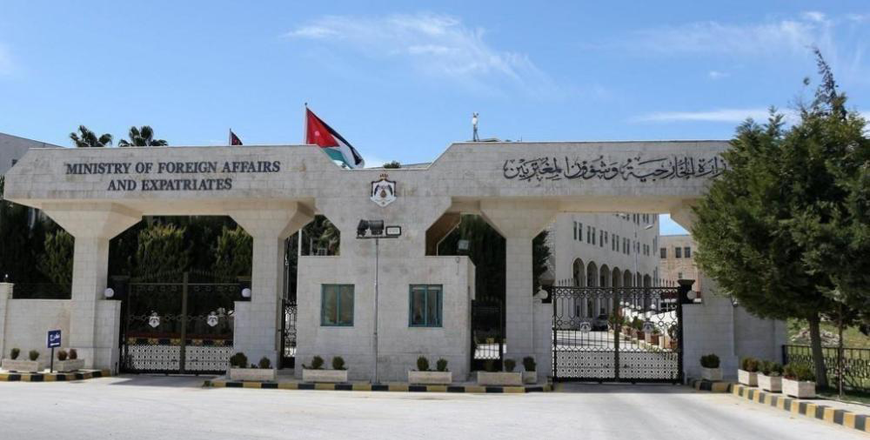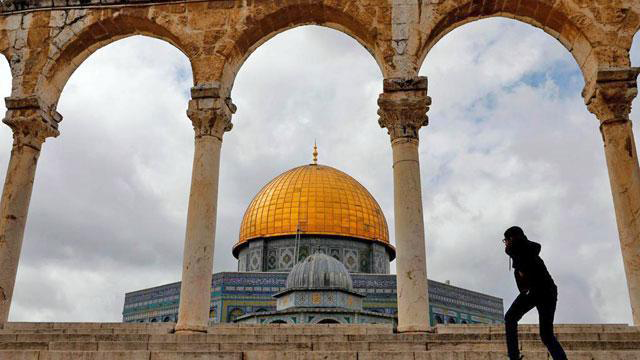You are here
Jordan, Arab ministerial committee condemn Israeli minister’s intrusion into Al Aqsa Mosque
By JT - May 23,2023 - Last updated at May 23,2023

A general view shows the Dome of the Rock at Al Aqsa Mosque compound in the Old City of Jerusalem (AFP file photo)
AMMAN — As head of the Arab ministerial committee in charge of international action to confront illegal Israeli policies in occupied Jerusalem, Deputy Prime Minister and Foreign Minister Ayman Safadi on Sunday called on the foreign ministers of the committee’s member states and the Arab League Secretary-General, Ahmed Abo Al Ghait, to discuss the Israeli minister of national security's incursion into Al Aqsa Mosque/Al Haram Al Sharif, which was carried out under the protection of Israeli occupation forces.
Members of the committee, comprising the UAE, Algeria, Egypt, Morocco, Palestine, Qatar and Saudi Arabia, stressed that the Israeli minister's incursion into Al Aqsa Mosque is a provocative step that is condemned in the strongest terms, and constitutes a flagrant and unacceptable breach of international law and of the historical and legal status quo in Jerusalem and its sacred sites, according to a Foreign Ministry statement.
They reiterated that the move also constitutes a serious escalation that requires the international community, including the Security Council, to immediately implement effective steps that will oblige Israel, as the occupying power, to cease its aggressions against the Palestinian people, stop its violations of international law and humanitarian law and refrain from any provocative steps in Jerusalem that would offend the world’s two billion Muslims. The members stressed that Israel has no sovereignty over Jerusalem and its holy sites, and that East Jerusalem is an occupied Palestinian territory.
They also reiterated that Al Aqsa Mosque/Al Haram Al Sharif, with its total area of 144 dunums, is a place of worship for Muslims alone, and that the Jordan-run Jerusalem Awqaf and Aqsa Affairs Department is the sole authority to supervise the holy site’s affairs and manage its entries.
The members of the committee condemned in the strongest terms the occupation government's dangerous precedent that it set by holding a meeting in the illegal tunnels next to the the Al Buraq Wall of Al Aqsa Mosque, a few days after the government approved its sponsorship of the condemned “flag march”, where individuals stormed neighbourhoods in Jerusalem's Old City under the protection of occupation forces.
The committee emphasised that such provocative and unlawful acts are null and void, and have no legal effect.
The foreign ministers also stressed the importance of continuing concerted Arab efforts to protect Al Aqsa Mosque and Islamic and Christian holy sites in occupied Jerusalem, the capital of the State of Palestine.
Safadi stressed the importance of supporting the steadfastness of Jerusalemites in the face of Israel's aggressive policies and practices aimed at controlling the city and changing its Islamic and Christian character and the historical and legal status quo of the mosque, imposing a temporal and spatial division at the holy site.
The members of the committee affirmed their support for the Hashemite Custodianship over Muslim and Christian holy sites in Jerusalem, and its role in protecting their Islamic and Christian Arab identity and supporting the Jerusalem Committee and Bayt Mal Al Qods Acharif Agency.
They called on the international community and the Security Council to pressure Israel, as the occupying power, to halt the violations aimed at changing the legal and historical status of Al Aqsa Mosque/Al Haram Al Sharif, which would further deteriorate the situation in the region, holding Israel fully responsible for the results of its provocative actions.
Following consultations held by the Kingdom's delegation to the Arab League in Cairo with the delegations of the member states of the committee, the member countries stressed the need to activate efforts aimed at achieving a comprehensive, just and lasting peace on the basis of international law, relevant UN resolutions, the Arab peace initiative and the two-state solution, which guarantees the establishment of an independent, sovereign, geographically connected and viable Palestinian State on the pre-1967 borders, with East Jerusalem as its capital, and halting all illegal Israeli actions that undermine this solution.
Related Articles
AMMAN — The Foreign Ministry on Thursday condemned the storming of Al Aqsa Mosque/Al Haram Al Sharif led by the Israeli national security mi
AMMAN — Jordan on Wednesday condemned the actions of an extremist Israeli minister, members of the Knesset and other extremists who stormed













